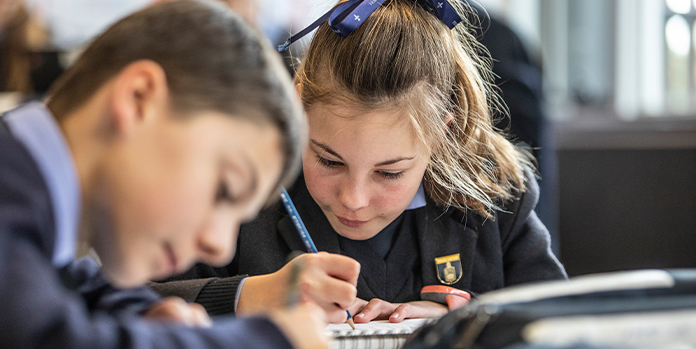By the time a student reaches the end of Year 6 at Grimwade House, we want them to be independent thinkers, capable of analysing and solving intricate problems and confident in relation to the next steps in their educational journey. And we do that by giving them a strong educational and social framework from which to work.
While this framework has several foundational elements – strong literacy and numeracy skills, an ability to interact with and empathise with others, and a sense of safety and comfort – no two student learning journeys will be exactly the same. Every student engages with learning – and with life – differently to the person sitting next to them.
A shift in the approach to teaching
When many of us think back to our own school experiences, we remember a “chalk and talk” style of teaching—an environment of direct instruction in which a single teaching method was applied to every student. At Grimwade House, today’s primary school classrooms are very different places.
While the importance of core academic outcomes is still paramount, the strategies we use to reach these outcomes have transformed. Direct instruction is still a powerful teaching tool, but the difference now is that many other approaches are used as well, giving a much richer learning experience than occurred in the past.
Here, teachers are highly skilled at growing knowledge and understanding as well as creativity and adaptability across their classroom. For example, they have the expertise to employ a “multimodal” approach which, in essence, uses a wide range of auditory, visual, and kinaesthetic teaching tools. This approach reflects the fact that each child learns in their own way, requiring a different set of stimuli and pedagogy to stay fully engaged.
At Grimwade House, we recognise that this approach sometimes requires additional resources if each student is to get the individual attention they need. We support multimodal teaching in a number of ways, such as through staff training, the provision of additional staff in the classroom during literacy and numeracy lessons, and by providing core subjects with adequate time in the timetable.
Enhancing the understanding of academic concepts
Of course, this multimodal approach must also reflect the fact that younger students learn very differently to older students, and take into account that we want to extend students well beyond basic knowledge.
From Prep to Year 2, we use structured play-based learning to enhance the explicit teaching of academic concepts. Among its many benefits, play-based learning helps students think a little bit more deeply about what they’ve just been taught, and encourages them to start asking “Why?”
This is higher order thinking, but that doesn’t mean it’s outside the capabilities of a young primary schooler. In fact, at Grimwade House children as young as five are able to turn play-based learning into complex investigation and exploration – to test a concept in practice.
In Years 3 to 6, in addition to cementing core academic foundations, we create opportunities for students to explore material on their own terms, to ask questions, and to discover the areas where they may want to develop their knowledge more fully.
In these Upper Primary years, the use of “visual thinking” becomes particularly important. Making thinking visual is a toolset we use to help students articulate the approaches these use in generating ideas, reasoning and seeking understanding. By prompting students to explain how they got from A to B in their thinking, for example. And a teacher’s role then might be to ask about that process: ‘What happened between those two points?’ ‘Could there be a better, easier or more creative way to get there?’.
The importance of pastoral care
Whether we’re teaching a mathematical concept or introducing students to a new outdoor game, our first priority is always to ensure they feel happy, safe, and ready to learn.
Pastoral care is critical for two main reasons.
The first: it facilitates what we call social emotional learning. In the most straightforward terms, this is learning how to be human – how to interact with people. A brilliant abstract understanding of literacy and numeracy is one thing; applying it is another entirely. And application relies heavily on the ability to deal with others – to transfer information, to collaborate, to compromise, and so on.
The second: it helps students to feel safe and nurtured. That’s important in and of itself, but it’s also essential for good academic progress. Humans only have a limited amount of mental processing power – an ability to deal with what’s known as cognitive load. If students are dedicating significant ‘resources’ to dealing with feelings of discomfort or to other distractions, that leaves little space for learning.
Why does our approach matter?
The importance of the approach Grimwade House takes to primary school education can’t be understated.
A good philosophical and technical underpinning, combined with exceptional teaching, leads to students who move into secondary school ready for its many challenges, vagaries and vicissitudes.
I’m biased, but I’ll say it anyway: teaching is the best job in the world. It’s also the most important. We’re developing the next prime ministers, the next leaders of industry, the next partners, parents, carers, neighbours. The next teachers.
I believe that each student’s experience at Grimwade House should be a personal journey, supported by teachers who know exactly who they are, what they need, and what their next step could be.
What we teach matters. Perhaps how we teach – using thought, care and evidence with the intent to build thinkers with ideas – matters even more.
Royce Helm
Head of Grimwade House



